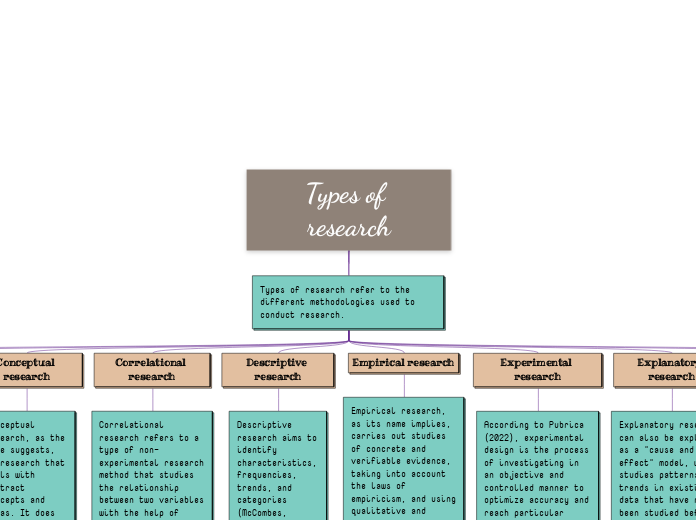Types of research
Types of research refer to the different methodologies used to conduct research.
Analytical research
It is a specific type of research that involves critical thinking skills and the evaluation of facts and information related to current research.
Example
Study of how the use of ICTs has increased in the teaching of a new language.
Applied research
It is a non-systematic process that provides solutions to specific problems or questions. It is called "unsystematic" because of its straightforward approach to finding solutions (Voxco, 2021).
Example
For example, researchers conduct basic research on how stress levels affect college students academically, emotionally, and socially.
Conceptual research
Conceptual research, as the name suggests, is research that deals with abstract concepts and ideas. It does not involve hands-on experimentation but relies on the researcher's analysis of available information on a given topic (Voxco, 2021).
Example
Essay about the educational thinking of the new generation of teachers. This paper made by psychologists may give observations about the student’s points of view.
Correlational research
Correlational research refers to a type of non-experimental research method that studies the relationship between two variables with the help of statistical analysis (Voxco, 2021).
Example
Consider a hypothetical study on stress and college life in which a researcher intends to study the relationship between illness (stress) and its incidence in college life.
Descriptive research
Descriptive research aims to identify characteristics, frequencies, trends, and categories (McCombes, 2022).
Example
For example, a mobile application developer who wants to know the fashion trends among students at university X will conduct a demographic study of this region, collect data on the population and conduct descriptive research on this demographic.
Empirical research
Empirical research, as its name implies, carries out studies of concrete and verifiable evidence, taking into account the laws of empiricism, and using qualitative and quantitative methods that are indispensable to gathering such information (Bouchrika, 2022).
Example
An example of empirical research would be if a researcher were interested in finding out whether foreign language learning promotes social behavior.
Experimental research
According to Pubrica (2022), experimental design is the process of investigating in an objective and controlled manner to optimize accuracy and reach particular conclusions about the statement of a hypothesis.
Example
Schools follow the pre-experimental research design to assess students at the end of a cycle. Students can be considered dependent variables and classes as independent variables. Since the exams are administered at the end and not at the beginning of the semester, it is easy to conclude that this is a single case study.
Explanatory research
Explanatory research can also be explained as a "cause and effect" model, which studies patterns and trends in existing data that have not been studied before. For this reason, it is often considered a type of causal research (Tegan & Merkus, 2022).
Example
For several years in a row, career coordination of English has been keeping statistics on the achievement of undergraduate students in both the first and second semesters. They analyzed their final grades and observed that students who take a separate support course always get higher grades than students who do not take a support course.
Exploratory research
This type of research is used to study a general idea or a specific question for which there is no pre-existing knowledge or paradigm to support it (Tegan, 2022).
Example
For example, a teacher trying to formulate a model to improve student learning may carry out existing research in similar areas.
Fundamental research
Also known as pure or basic, this kind of research is mainly concerned with generalizations and with the formulation of a theory (Kothari, 2004).
Example
In education, fundamental research is used to develop instructional theories that explain teaching and learning behaviors in the classroom. For example: how does the use of the Pearson platform influence self-learning? In education, basic research is used to develop instructional theories that explain teaching and learning behaviors in the classroom.
